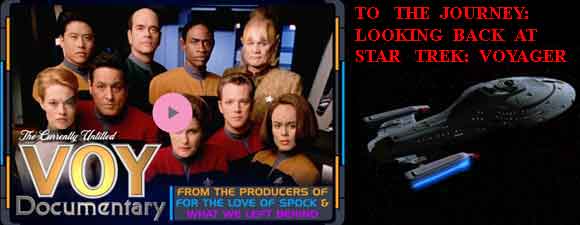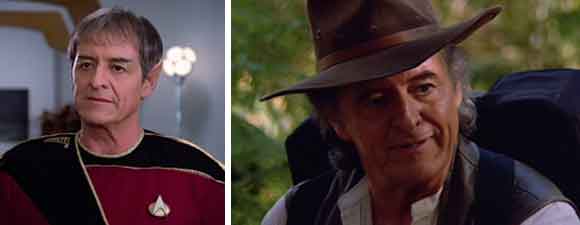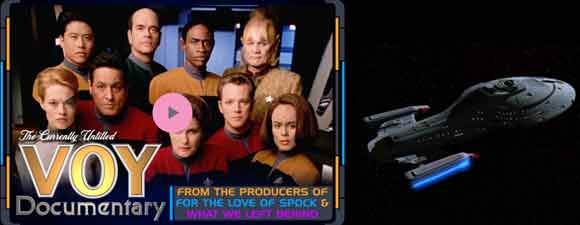Retro Review: Heroes and Demons
6 min readThe Doctor enters a holonovel based on Beowulf that has caused several crewmembers to disappear.
Plot Summary: Janeway asks Torres to beam up a photonic energy sample that may help the ship boost its power. Shortly afterward, Harry Kim disappears from the holodeck, and when Chakotay and Tuvok investigate whether a glitch occurred in Kim’s Beowulf holonovel, they vanish as well. Because the Doctor is holographic, Janeway asks him to try to find out what happened to the crewmembers, giving him full control over his program so that he can become incorporeal within the program if he finds himself threatened. The Doctor, who chooses the name Schweitzer in honor of the medical missionary, lets the warrior Freya believe that he’s an expert in herb lore and demonstrates that he is impervious to wounds, causing him to be celebrated by most of King Hrothgar’s warriors and romanced by Freya, who gives the Doctor the alarming news that the hero Beowulf has died in battle with the fearsome Grendel. When the monster attacks, it proves to be made of photonic energy and destabilizes the Doctor’s matrix, destroying his arm before the crew can remove him from the holodeck. Once his arm has been replaced, Janeway and Torres study the readings and discover that the photonic energy produces a synaptic pattern. Realizing that in beaming up the energy, they have captured living beings, the Doctor suggests returning to the holodeck with their samples to give to “Grendel” in the hope that the crewmembers will be restored in exchange. Freya is killed when one of Hrothgar’s warriors attacks the Doctor, believing him to be in league with Grendel. In the Danes’ Great Hall, the Doctor frees the photonic energy beings, and soon after, Kim, Chakotay, and Tuvok reappear. The Doctor tells Janeway that he doesn’t want to keep the name Schweitzer because it now has painful associations for him. Janeway says that this holodeck adventure surely won’t be the Doctor’s last.
Analysis: I get the impression that Naren Shankar must have been forced to study Beowulf in an English lit class and “Heroes and Demons” is his revenge. The plot is pretty superficial and the science is pretty nonsensical. I’ll accept that there can be photonic energy beings, and that crewmembers could be converted to such energy then restored, since we’re supposed to believe that’s what the transporter does…though metaphysically, the transporter is really taking people apart at the molecular level and reconstituting them, meaning that the person who reappears is not precisely the same person who disappeared but a sort of copy, and there are lots of articles about what happens to one’s essence or core or soul during transport/conversion to energy and whether you “die” and are reborn every time you transport. I can let such dilemmas slide, yet I have a lot of trouble accepting that contact with an energy surge that disrupts his holographic matrix would only damage the Doctor’s arm, not his entire body, such as it is. Then again, The Next Generation‘s holodeck episodes include some of the silliest scientific premises of that series, so rather than holding Voyager to a higher standard, I’ll just focus on the things I enjoy about this one. It’s a delightful outing for the Doctor, giving us the first hint of the range of possibilities for a character who at first seemed as though he might be stuck, literally and figuratively, in his role as emergency medical hologram. Now we know that he can get out of sickbay as long as there’s a holo-emitter, setting in motion the likelihood that eventually he’ll get a portable emitter. Plus we see that he can handle a first-contact situation, adapt himself to non-medical challenges, and – inevitably – discover, like Data, that his computer programming makes it possible for him to have love affairs.
I’m ambivalent about the fact that the Doctor must act as a hero in a non-medical sense; often on Star Trek the roles of warrior and spy are privileged over those of explorer and caretaker, though the philosophies of infinite diversity in infinite combinations and peaceful coexistence are more dependent on the latter than the former. Since he presents himself as an expert in herb lore to a culture that believes in the equivalent of sorcery, and since we can see that he has little programming to tell him how to use a weapon, it would have been more logical to see the Doctor reject the sword in favor of something from the medical arts as they were practiced in the era of the Spear-Danes. Later, in Voyager‘s weaker episodes, the Doctor is sometimes written as a sight gag, like Odo before him – a character who could come and go, who couldn’t bleed, who could evade any attack due to a quirk of biology not always appreciated by the one performing the trick. Even more than Data, the Doctor might have been considered the property of Starfleet and the designers who created him – indeed, even Janeway seemed to think so at first – so it’s very important that he be treated as a person rather than an object at all times by the characters to whom we’re expected to relate. Clearly he considers Kes a friend and comrade, which suggests he’s more than the sum of his programming, since I’d think anyone creating an emergency hologram would strive specifically to avoid making a being that might empathize or identify with patients. I remember being bothered in later seasons at how readily he talked back to Janeway in a way I found disrespectful, so it’s interesting to see that even this early, he doesn’t behave with the same subordinate sense as nearly everyone else serving on the ship. He asks a lot of questions and accepts a lot of advice, but it’s because he’s venturing into unknown territory, not because he feels as a Starfleet officer that he must put up with whatever the captain tells him.
The Doctor’s initial social overtures to Freya look like an extension of his relationships with Kes and Janeway, a combination of curiosity and formal reaction, so it’s surprising and amusing when Freya then shows romantic interest in him. He’s probably the first man who neither grovels to her as the daughter of the king nor challenges her as a woman in what’s evidently a patriarchal culture. I’m not sorry the Doctor doesn’t keep the name Schweitzer – the original a great humanitarian, but a deeply religious one, something Star Trek has never explored well in a character of human origins – but I had concerns when I first watched this episode that the subject of the Doctor’s name might become a series-long joke, with the character picking and discarding names whenever a little humor was needed. It’s more naturally funny to listen to Chakotay pick on Tuvok about Vulcan literature, which Tuvok proudly notes contains no demons and does not emphasize emotional behavior. Ironically, though Chakotay is familiar with Beowulf – apparently required reading even for humans of Native American descent born on planets far from Earth – he sums up the Old English epic as “monsters and swordplay, that sort of thing” (even Xena realized the poem hadn’t stuck around for centuries just because of the swashbuckling elements). If Chakotay and Tuvok are going to be friends now instead of adversaries from the Maquis, and equally supportive of Janeway, they need a bit of that Spock-McCoy dynamic, respectful mutual mocking. Any time there’s a dynamic where certain characters become overused for humor, like Neelix this first season, while other characters rarely get to have any fun, like Janeway in later seasons, the show becomes stagnant. Picardo’s Doctor, at least, consistently proves capable of more drama than his creators (within and without the show) could have guessed.







I’m watching Voyager for the first time, even though I’ve been a TOS fan since 1969 (because I lived in a TV-free household for a couple of decades), and I’m most of the way through the second season. So far, Picardo makes the most of every opportunity he’s given, acting rings around everyone but Mulgrew. I loved this episode, partly because it was just such a cool idea to have a holographic person tackle a holographic problem, partly because Picardo is just such a pleasure to watch.
I envy you for having new episodes to watch still! Voyager was my least favourite series but I still enjoyed it. Janeway and the Doctor were the only characters I really liked on Voyager and a Doctor episode was always enjoyable for me.
*smile* Thanks. It’s kind of strange, having been a TOS fan for so long, yet being new to other Star Trek. I’m finding Voyager a pretty easy entry for a TOS fan — there’s a dynamic captain, a Vulcan, and a snarky doctor, after all. 🙂
I do feel sorry for Tuvok, though; since Tim Russ’ name is 8th in the credits, that means that Tuvok doesn’t get to save the day with nearly the regularity that Spock did; the series leads get to do that. It’s funny how much less effective those Vulcan superpowers appear to be in the 24th century than they were in the 23rd. 😉
A good fantasy doctor episode. And just as we thought he had settled on a name! My rating: 7/10.